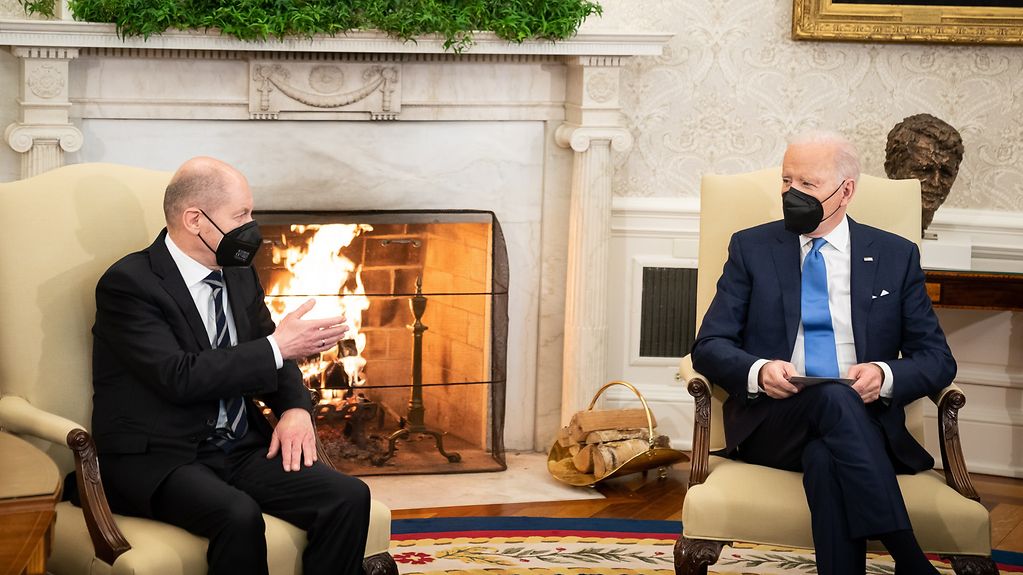Inaugural visit of the Federal Chancellor to the USA
Federal Chancellor Olaf Scholz met with US President Joe Biden on his inaugural visit to the American capital Washington, D.C. on Monday. The talks focused on the Ukraine crisis. The Federal Chancellor and the US President also discussed the priorities of Germany’s G7 Presidency.
4 min reading time

Federal Chancellor Scholz in conversation with US President Biden.
Photo: Bundesregierung/Kugler
“We have a close connection with the United States,” stressed Federal Chancellor Scholz after his inaugural visit to US President Biden in Washington, D.C. The transatlantic partnership between Germany and the USA was one of the “key constants of German policy” and would continue to be of the utmost importance in the future, said the Federal Chancellor.
“It will be extremely costly for Russia to take such a step”
The talks between the Federal Chancellor and the US President focused on the Ukraine crisis. “We’re in an extremely difficult situation,” said Scholz. “There’s a military threat to Ukraine that has to be openly addressed,” he said, adding that it was “a serious threat to security in Europe”.
It was important to “take joint action and stand together in doing whatever is necessary,” he said. All NATO allies had made their position clear: “If there is military aggression against Ukraine, tough, mutually agreed and far-reaching sanctions will be imposed. It will be extremely costly for Russia to take such a step,” said Scholz. This message had been repeated clearly and frequently enough “to reach Russia, too,” the Federal Chancellor added.
Prepared to “take swift, unified action”
Intense preparations to be able to determine sanctions in the event of military aggression were underway, said Scholz: “As undesirable as it is, we don’t want to wait for military aggression against Ukraine to occur before considering our response.” If this were to happen, said the Federal Chancellor, “we will be in a position to take swift, unified action – and we will certainly do so.”
Making the most of all diplomatic options
At the same time, stressed Scholz, it was important to “make use of all our diplomatic options.” He said he was happy to see that bilateral talks were going on between Russia and the USA, as well as under the NATO-Russia format and within the framework of the OSCE.
This also applied to the talks going on between Ukraine, Russia, France and Germany, said Scholz. This so-called Normandy format had not really been active for many years, said the Federal Chancellor. “But now we’re in a situation where we’re addressing tough issues with each other once again – and that’s the starting point for us to find ways out of this conflict,” he stressed.
Dual strategy most promising
The dual strategy of making “clear pronouncements with regard to sanctions” while at the same time pursuing “all forums available to us” was “the most promising approach in the current situation,” said Scholz.
G7: mandate to contribute to better global cohesion
The Federal Chancellor’s talks with the US President touched on other issues, too – in particular with regard to Germany’s G7 Presidency this year. As economically strong democracies, the G7 had a “very special mandate” to contribute to better global cohesion. This particularly included enabling “the citizens of this planet to get vaccinated” – not just those in the rich countries “but also in countries where many people would like to get vaccinated but are unable to get hold of the vaccines”, said Scholz.
Enjoying prosperity without damaging the climate
In addition, the Federal Chancellor said, it was a crucial to combat man-made climate change – “where global success can clearly only be achieved as a result of joint action.” With their technological and economic possibilities, the industrialised nations had an important contribution to make here, said Scholz, “in creating the conditions for us to be able to enjoy prosperity here and in other countries of the world without damaging the climate”. This challenge was of great importance, he said, which was why the aim was for those with the will to address this issue to discuss the establishment of a Climate Club and ensure that “everyone was invited to join”, explained the Federal Chancellor.
Scholz said the talks with President Biden had been “very personal and very in-depth”, thereby reflecting the “the sound cooperation between our countries and the firm bond of our transatlantic partnership”. “It also demonstrates that both countries are able to rely on each other,” said Scholz.
Long-standing relations
Germany and the USA are bound by very close, long-standing and trusting relations. The USA is Germany’s most important non-European partner and ally. The two countries are also closely connected in the economic and cultural spheres. In addition to the lively exchange of visitors, there are of course countless private contacts between the two countries, too.










